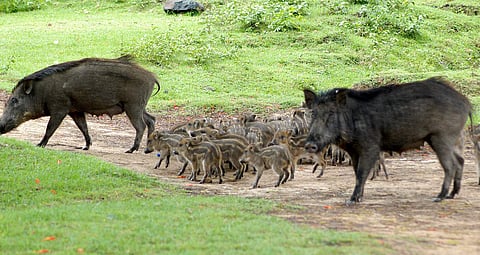

GUWAHATI: The virus of the deadly African swine fever (ASF) has spread to the wild of Arunachal Pradesh.
The forest officials in the state retrieved the carcasses of six wild boars in East Siang district. Several other wild boars were reported to have also died in Upper Siang district in the past few days.
Divisional Forest Officer, Tashi Mize, suspected that ASF was the reason behind the deaths of the animals.
“The carcasses of six wild boars were retrieved from a community forest, located some 20-25 km from (East Siang district headquarters) Pasighat and upstream river Sille. They were of two adults, one semi-adult and three piglets. We suspect that they died due to ASF,” Mize told The New Indian Express.
He said the locals had informed him of the deaths. Three forest officials, who had marched around 10 km to reach the site and retrieve the carcasses, collected samples. The samples will be tested at the National Institute of High-Security Animal Diseases Laboratory.
“Porcupines eat such carcasses but I don’t think they will be infected. The other animals are also unlikely to be infected by the ASF,” Mize said, adding, “The Veterinary Department has identified all areas in the grip of ASF. We have issued instructions to all concerned to ensure that wild boars and domestic pigs don’t come near each other.”
The state’s Forest Department has advised people not to hunt wild boars or eat their meat. The state has also recorded the deaths of domestic pigs in recent times.
The situation is worse in Assam where over 13,000 domestic pigs have died of ASF so far. As the domestic pigs might infect wild boars, the government has already alerted the forest department.
The authorities at the Kaziranga National Park have dug a 2 km long and six feet deep trench to protect the park’s 15,000 wild boars.
There is a village adjacent to the park’s Agoratoli range where the locals rear pigs. There is always a movement of domestic as well as wild boars in the area. As this could endanger the lives of wild boars, the park authorities have dug the trench.
AFS was first detected in 1921 in Kenya. No vaccines or medicines have been discovered so far.